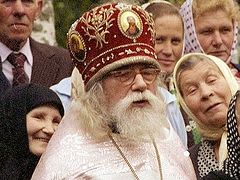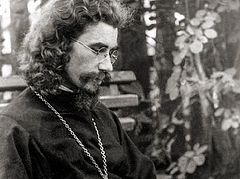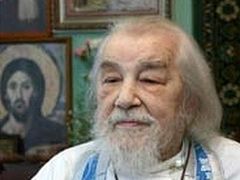In the name of the Father, the Son, and the Holy Spirit!
In today’s Gospel text we heard the story of our Lord Jesus Christ’s curse upon the barren fig tree. This is one of the more difficult Gospel passages to understand. The Lord cursed the barren but leafy fig tree when He found no fruit on it. It would seem that it was all sufficiently clear. But Evangelist Mark unexpectedly adds, for the time of figs was not yet (Mk. 11:13); that is, the time of fruit bearing, the harvest, simply hadn’t come yet. But the Lord implacably curses that fig tree, and it withers.
Many hit a dead end at this unexpected, harsh, and seemingly unfair judgment upon the fig tree. But for us standing here in this church today, on the repose day of Archimandrite John (Krestiankin), the very man whose memory we have gathered to celebrate answers this perplexity.
Most of us standing here remember our meetings with Fr. John. For many he was their father confessor. But was there ever a time when we came to him and it was not his time of spiritual fruit bearing? Was there ever even a single meeting over those many years when he did not give us the fruits of the Holy Spirit, cherished by him on the tree of his monastic and priestly life? It never happened! In God’s true pastor, in a true Christian, the time of fruit bearing never ends.
Fr. John gave us a great, beautiful, and joyful example of the possibility for that unceasing fruit bearing that is so pleasing to God. In his youth, and then in maturity, and even—I won’t hesitate to say it—with the physical weakness and feebleness of old age, whenever we came to him we always received the purest spiritual fruits of his saving council, his fervent prayers, which as he liked to say, “came from his whole heart and soul.”
Whether ill or healthy, tired after many hours of receiving hundreds of people day after day, or filled with strength after a brief rest in prayer, Fr. John was transformed when he heard God’s voice telling him that he must fill people, strengthen them with the fruits of his spiritual life. He had to support and console the suffering people who came to him.
There are different opinions that consolation is almost something psychotherapeutic—a sort of soothing psychological support. But, no. True spiritual consolation is something completely different. It is when a person receives in any trials, even the most difficult, grace-filled strength for life and salvation; the strength and wisdom to understand how these trials are transformed into our saving cross. It is the strength for spiritual triumph.
The fruits of the Spirit according to Apostle Paul are love, joy, peace, longsuffering, gentleness, goodness, faith (Gal. 5:22). Fr. John was one who had the gift of spiritually satisfying people with these fruits. He was one of those whom in the Gospel story about the fig tree the Lord called his disciples to become. Not a tree living according to the laws of nature—now bearing fruit, now falsely inspiring hope for fruits by his grandiose appearance but found after inspection to be barren. The Lord calls His disciples to a supernatural life—to always bear fruit!
It is impossible to overestimate the significance of Fr. John and the elders of the Pskov Caves Monastery. Just as in the nineteenth century when Russian society had lost faith and lost God, Optina Monastery gave it strength, so also in in the even more severe twentieth century it was the Pskov Caves Monastery that brought several generations of our compatriots to God.
Archimandrite John’s faith, love, mercy, and amazing courage had enormous significance here.
We thank the Lord that the majority of us standing here today had the opportunity to see Fr. John and partake of his spiritual table. We remember how he gave all of himself to us without reserve. Time will pass, and another sermon on his repose day will say, “We thank God that at least a few of us remember Fr. John, while the rest live by other’s memories of him.” Then the time will come when there will be no one left on earth who knew Fr. John personally. But we see with our own eyes how the fruits of his spiritual garden, his spiritual inheritance, his power of love and faith bear fruit today and will serve people for many centuries.
I would like to wish for all of us that we gathered here today, just as during Fr. John’s life, might also receive the same consolation, the same joyful strength for life and the struggle with sin that Elder Archimandrite John (Krestiankin) gave. By his prayers, O Lord Jesus Christ, Son of God, have mercy on us. Amen!





